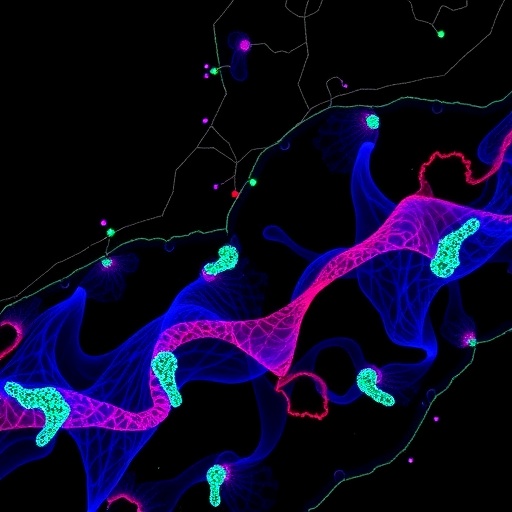In a groundbreaking study published recently in Cell Death Discovery, researchers have unraveled the intricate molecular mechanisms by which the transcription factor ATF3 modulates the progression of pancreatic intraepithelial neoplasia (PanIN), a known precursor to pancreatic ductal adenocarcinoma (PDAC). This investigation provides critical insights into how acinar-specific loss of ATF3 influences KRAS^G12D-driven transcriptional programs, casting new light on early pancreatic tumorigenesis and offering potential avenues for targeted therapeutic intervention.
The pancreas, a vital organ responsible for both endocrine and exocrine functions, harbors acinar cells that produce digestive enzymes. Dysregulation in these cells often sets the stage for the development of PanIN lesions, which if unimpeded, can evolve into invasive PDAC, a notoriously aggressive cancer with dismal prognosis. The oncogenic KRAS^G12D mutation is ubiquitously acknowledged as a central driver of pancreatic tumorigenesis; however, the modulatory role of key transcription factors like ATF3 in this context has remained elusive until now.
ATF3, or activating transcription factor 3, is part of the stress-responsive ATF/CREB family of transcription factors. It is rapidly induced under various physiological stresses and has been implicated in diverse cellular processes, ranging from apoptosis to cell cycle regulation. In pancreatic acinar cells expressing mutant KRAS^G12D, the functional role of ATF3 is particularly intriguing given its dual capacity to act as both a transcriptional activator and repressor, contingent upon cellular context.
By employing genetically engineered mouse models with acinar-specific deletion of ATF3 combined with KRAS^G12D activation, the research team meticulously delineated the landscape of transcriptional alterations. These models revealed a stark attenuation in PanIN lesion formation when ATF3 was absent, underscoring its pivotal role in facilitating KRAS-mediated neoplastic transformation of acinar cells.
Granular transcriptomic analyses uncovered that loss of ATF3 markedly restricted the breadth and magnitude of KRAS^G12D-driven transcriptional changes. This suggests that ATF3 acts as a critical mediator or co-factor, amplifying the oncogenic KRAS signaling cascade. Among the affected pathways were those governing cell proliferation, inflammation, and extracellular matrix remodeling—hallmarks of early pancreatic cancer development.
Intriguingly, ATF3 deficiency not only dampened KRAS-induced gene expression shifts but also appeared to stabilize acinar cell identity, a state often lost during the acinar-to-ductal metaplasia (ADM) process that precedes PanIN formation. This stabilization potentially blocks the cellular plasticity required for neoplastic progression, pointing towards a tumor-promoting role of ATF3 in this context.
This revelation challenges previous paradigms that broadly categorized ATF3 as a stress-induced protective factor. Instead, in the specific milieu of KRAS^G12D-mutant pancreatic acinar cells, ATF3 emerges as a facilitator of oncogenic transcription networks, thereby promoting early neoplastic lesion formation. This nuanced understanding redefines ATF3’s biological significance and invites reconsideration of its role in cancer biology.
Furthermore, the study underscores the therapeutic potential of targeting ATF3 or its downstream transcriptional partners to impede KRAS-driven pancreatic tumorigenesis. Given the current limitations in directly targeting mutant KRAS protein pharmacologically, modulating its transcriptional co-factors presents a promising alternative strategy to restrict tumor initiation and progression.
From a clinical perspective, early detection and interception of PanIN lesions are paramount for improving pancreatic cancer outcomes. The identification of ATF3 as a molecular switch governing KRAS-driven transcriptional reprogramming enhances the repertoire of biomarkers and molecular targets that could refine early diagnostic and therapeutic approaches.
The investigators also explored the epigenetic landscape accompanying ATF3 loss, illuminating changes in chromatin accessibility and histone modifications that correlate with suppressed oncogenic transcriptional activity. Such epigenetic insights deepen our comprehension of how transcription factors like ATF3 orchestrate complex genetic programs in neoplastic transformation.
This research contributes a vital piece to the complex puzzle of pancreatic carcinogenesis and illustrates the intricate crosstalk between oncogenic drivers and transcriptional regulators. It propels the field forward by elucidating a novel dependency of KRAS^G12D-induced pancreatic tumorigenesis on ATF3, fostering hope for more effective combinatorial therapeutic regimens in the future.
Importantly, the study’s design, leveraging tissue-specific genetic manipulations in vivo, provides a robust platform to interrogate context-dependent gene functions. This methodological approach serves as a blueprint for exploring other transcription factors implicated in cancer and underscores the necessity of cell-type specific investigations in the quest to fully understand tumorigenic processes.
As pancreatic cancer continues to represent a formidable clinical challenge, such fundamental discoveries are crucial in steering new research directions. Future work will need to elucidate the precise molecular interactome of ATF3 within KRAS-mutant acinar cells and potentially identify small molecules or biologics capable of modulating its activity.
In sum, this pioneering work reveals that acinar-specific ATF3 is not merely a passive bystander but an active participant in sculpting the oncogenic transcriptional landscape driven by KRAS^G12D mutations. Its loss impedes the transition of acinar cells toward pre-cancerous PanIN lesions, presenting an attractive target for early intervention in pancreatic cancer.
The implications of these findings extend beyond fundamental biology, offering a new conceptual framework for understanding how transcriptional dynamics intersect with oncogenic signaling in the pancreas. As therapeutic strategies evolve, targeting transcriptional co-factors such as ATF3 may become integral components of comprehensive pancreatic cancer management.
With pancreatic cancer projected to become an increasingly prevalent cause of cancer mortality globally, insights like these fuel optimism for breakthroughs that could transform patient outcomes by intercepting disease at its earliest—and most treatable—stages.
Subject of Research:
Role of activating transcription factor 3 (ATF3) in pancreatic acinar cells during KRAS^G12D-driven pancreatic intraepithelial neoplasia (PanIN) progression.
Article Title:
Acinar-specific loss of activating transcription factor 3 restricts KRAS^G12D mediated transcriptional changes and PanIN progression.
Article References:
Martin, M.B., Mousavi, F., Goebel, G. et al. Acinar-specific loss of activating transcription factor 3 restricts KRAS^G12D mediated transcriptional changes and PanIN progression. Cell Death Discov. 11, 503 (2025). https://doi.org/10.1038/s41420-025-02777-2
Image Credits: AI Generated
DOI: 10.1038/s41420-025-02777-2 (Published 06 November 2025)




